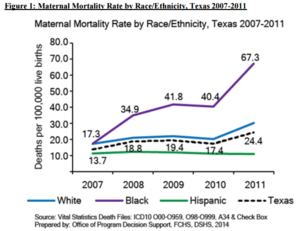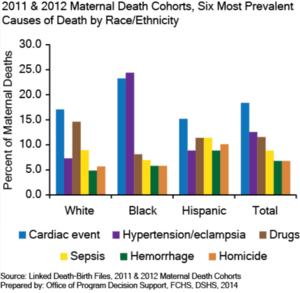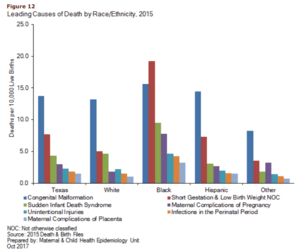Maternal Mortality and Morbidity Task Force facts for kids
The Maternal Mortality and Morbidity Task Force was created in 2013 by the Department of State in Texas. Its main goal is to help lower the number of deaths of mothers in Texas.
Contents
Why Was the Task Force Formed?
In 2016, Texas had a very high rate of mothers dying during or after childbirth. This rate was higher than in many other developed countries. For example, the rate in Texas was 35.8 deaths per 100,000 births. This was much higher than the average for most other U.S. states.
The number of maternal deaths in the United States generally increased from 2002 to 2015. Even with better healthcare, some women still face serious problems during pregnancy. The World Health Organization (WHO) tracks these numbers. Since 1994, a "maternal-related death" is counted if it happens up to one year after childbirth.
Understanding the Differences
A big concern was that Black women in Texas and across the U.S. had a maternal death rate more than twice as high as White women. This difference has grown since 2007. Because the reasons for this were not clear, the Task Force was created to investigate.
What Does the Task Force Do?
The Task Force and the Department of State Health Services (DSHS) work together. They study why mothers are dying and what can be done to prevent it. They then write reports with their findings and ideas. These reports are sent to the governor, lieutenant governor, and other Texas lawmakers every two years.
Since it started in 2013, the Task Force has published two main reports. One was in July 2014, and the other was in September 2016.
Key Findings from Reports
The latest report showed a much higher increase in maternal deaths for Black women. This might be linked to several factors. For example, some studies show that Black women may have higher rates of obesity before pregnancy. Obesity can increase the chance of needing a first-time cesarean section, which is a surgical birth.
Another possible reason is that Black women might face challenges in getting healthcare. This could mean less access to medical services or important health information. The Task Force continues to study these complex issues.
See also
- Maternal mortality in the United States
- Maternal healthcare in Texas




